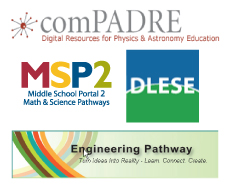Helping Digital Libraries Make the Standards Connection
Now in the final year of a project funded by the NSF’s National STEM Education Distributed Learning (NSDL) program, Project 2061 is helping digital library developers determine how well their resources address K-12 science content standards and how likely they are to contribute to student learning. Being able to search for and select resources that target the learning goals in state and national standards is a critical need for teachers and key to increasing usage of the NSDL collections.
A March 2009 workshop brought together representatives from seven NSDL Pathways-portals that provide access to content- and audience-specific digital resources. The participating Pathways serve a broad range of interests, and their collections include resources for middle school teachers; for educators working in informal science settings; and for those focusing on teaching topics in the life or earth sciences, engineering, or chemistry. Participants from the National Science Teachers Association and from NOAA also attended.
During the workshop, Project 2061’s Ted Willard trained the participants in applying a procedure developed by Project 2061 to analyze the content alignment and instructional quality of science teaching materials. To accommodate each Pathway’s specific training and resource analysis requirements, workshop materials have been refined as needed, and Project 2061 is now conducting site visits and Pathway-specific training sessions. Customized workshops have been given to collection developers at ComPADRE: Physics & Astronomy, Digital Library for Earth System Education (DLESE), the Engineering Pathway, and the Middle School Portal2: Math & Science Pathways. Project 2061 has also expanded the scope of its training to include staff at newly funded Pathways in the fields of engineering and computing and to staff at NSDL’s Technical Network Services and at its Resource Center.
Resource Quality Criteria
Project 2061’s training introduces developers of NSDL digital collections to a set of criteria for judging content alignment and instructional quality and then helps them apply the criteria to their K-12 resources. After the training, developers use the criteria to review their resources and answer the following questions:
Content Alignment
- What part(s) of the learning goal does the resource address?
- Does the resource address the part(s) explicitly?
Instructional Quality
- Is the resource likely to make the learning goal comprehensible to students?
- Is the resource likely to engage students and motivate them to focus on the learning goal?
- If the resource is a phenomenon (that is, real-world objects and events), is it likely to be observed as intended?
- If the resource is a representation (for example, graphs, simulations, and animations), does it accurately represent the relevant aspects of the learning goal?
The Project 2061 criteria are also being embedded into the NSDL Collection System (NCS), a tool that is used for creating and managing digital collections. Project 2061 has already used its criteria effectively to evaluate science and mathematics textbooks and to review and select middle school science materials in a previous NSDL project called PRISMS.
Feedback and Impact
So far, feedback from workshop participants has been extremely positive. In interviews with the project’s external evaluator, 78% of participants in the first training workshop reported that they had learned the skills necessary for conducting a resource analysis and planned to use those skills (or to train others to use them) to align their digital collection’s resources to standards.
Working with Digital Learning Sciences, Project 2061 is now exploring ways to find out how NSDL users, particularly K-12 teachers, are likely to benefit from the information that an analysis provides about the quality of a resource. For example, focus groups with teachers who use NSDL resources will shed light on their perceptions of the resources themselves and the value of the resource reviews. Project 2061 will also gather teachers’ feedback on how best to present the reviews at nsdl.org so that they can better serve the needs of educators.
# # #
For more information about Project 2061’s NSDL projects, please contact:
Principal Investigator: Dr. Francis Molina, (202) 326-7002
Also in the August 2010 issue:





